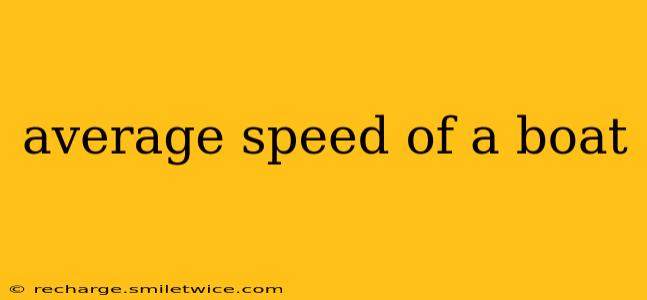Determining the average speed of a boat isn't a simple case of plugging numbers into a formula. It's a multifaceted question influenced by several factors, making a single "average" difficult to pinpoint. This guide will delve into the various aspects affecting boat speed, allowing you to understand how to calculate an average speed relevant to your specific needs.
What Factors Influence a Boat's Speed?
Before we even attempt to calculate average speed, let's understand what dramatically affects a vessel's performance:
-
Hull Design: Different hull types (planing hulls, displacement hulls, semi-displacement hulls) inherently achieve different speeds. A planing hull, designed to rise onto the surface at higher speeds, will have a significantly higher top speed than a displacement hull, optimized for fuel efficiency at slower speeds.
-
Engine Power: The horsepower of the engine directly correlates with the boat's potential speed. More powerful engines generally translate to faster speeds.
-
Weight: The total weight onboard (passengers, gear, fuel) significantly impacts performance. Heavier loads reduce speed and increase fuel consumption.
-
Water Conditions: Rough seas, strong currents, and waves all impede a boat's progress, drastically reducing its effective speed. Calm water, on the other hand, allows for optimal performance.
-
Wind: Headwinds will slow a boat down, while tailwinds can increase its speed. Crosswinds can also affect maneuverability and speed.
-
Propeller Type and Condition: The propeller's design and condition are crucial. A poorly maintained or inefficient propeller can severely limit a boat's speed.
How to Calculate Average Boat Speed
Calculating average speed typically involves dividing the total distance traveled by the total time taken. However, due to the variable nature of boat speed, this needs careful consideration.
Method 1: Simple Average Speed: This is suitable for relatively short trips with consistent conditions.
- Record the total distance traveled. Use a GPS or nautical chart plotter for accuracy.
- Record the total time taken. Start and stop your timer precisely.
- Divide the total distance by the total time. The result is your average speed (e.g., in knots or mph).
Method 2: Weighted Average Speed: For longer trips with varying conditions, a weighted average offers a more accurate representation. This involves breaking the journey into segments with relatively consistent speeds and then calculating a weighted average based on the time spent in each segment.
Method 3: GPS Tracking Devices: Modern GPS chartplotters and apps often provide detailed speed and distance information, including average speeds for a given journey. These devices automatically account for variations in speed throughout the trip.
How Do I Determine the Average Speed of My Specific Boat?
The best way to determine the average speed of your boat is through practical testing under various conditions. Conduct several trials, noting the factors mentioned earlier (weight, water conditions, etc.) for each trial. This data will give you a more accurate picture of your boat's performance under different circumstances.
What is the typical speed of a small motorboat?
The speed of a small motorboat is highly variable depending on the boat's size, engine power, and the conditions of the water. You might find small motorboats ranging in speed from 5 to 30 mph.
What is the average speed of a fishing boat?
The average speed of a fishing boat also depends heavily on its size and engine. Smaller fishing boats might average around 10-15 mph, while larger vessels could average 20 mph or more.
What affects the speed of a boat?
As discussed previously, several factors affect a boat's speed: hull design, engine power, weight, water conditions, wind, and propeller type and condition. All of these contribute to the overall performance of the boat.
How do I improve my boat's speed?
Improving your boat's speed might involve optimizing the propeller, reducing weight, upgrading the engine, or ensuring the hull is clean and free from fouling. Consider professional advice for significant modifications.
By carefully considering these factors and utilizing appropriate calculation methods, you can gain a much clearer understanding of your boat's average speed and its performance under different conditions. Remember that consistency in data collection is key to achieving accurate results.
